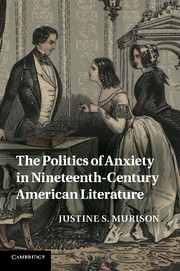Book contents
- Frontmatter
- Contents
- Acknowledgments
- Introduction
- 1 A bond-slave to the mind: sympathy and hypochondria in Robert Montgomery Bird's Sheppard Lee
- 2 Frogs, dogs, and mobs: reflex and democracy in Edgar Allan Poe's satires
- 3 Invasions of privacy: clairvoyance and utopian failure in antebellum romance
- 4 “All that is enthusiastic”: revival and reform in Harriet Beecher Stowe's Dred
- 5 Cui bono?: spiritualism and empiricism from the Civil War to American Nervousness
- Epilogue: the confidences of anxiety
- Notes
- Index
- CAMBRIDGE STUDIES IN AMERICAN LITERATURE AND CULTURE
2 - Frogs, dogs, and mobs: reflex and democracy in Edgar Allan Poe's satires
Published online by Cambridge University Press: 01 June 2011
- Frontmatter
- Contents
- Acknowledgments
- Introduction
- 1 A bond-slave to the mind: sympathy and hypochondria in Robert Montgomery Bird's Sheppard Lee
- 2 Frogs, dogs, and mobs: reflex and democracy in Edgar Allan Poe's satires
- 3 Invasions of privacy: clairvoyance and utopian failure in antebellum romance
- 4 “All that is enthusiastic”: revival and reform in Harriet Beecher Stowe's Dred
- 5 Cui bono?: spiritualism and empiricism from the Civil War to American Nervousness
- Epilogue: the confidences of anxiety
- Notes
- Index
- CAMBRIDGE STUDIES IN AMERICAN LITERATURE AND CULTURE
Summary
The line which demarcates the instinct of the brute creation from the boasted reason of man, is, beyond doubt, of the most shadowy and unsatisfactory character – a boundary line far more difficult to settle than even the North-Eastern or the Oregon.
Edgar Allan Poe, “Instinct vs. Reason – A Black Cat” (1840)In a posthumous tribute to its former editor, Edgar Allan Poe, the Southern Literary Messenger lauds Poe's poetry and psychological prose but registers disappointment that Poe consistently failed to be, well, funny in his comedy. The article contends that Poe's humor is “pure grotesque” and is therefore “too far removed from fleshly sympathies to excite the nerves of laughter.” In failing to provoke laughter, his satires instead seem written not by a human but by a “species of goblin monkey” with “twistings and quaint gesticulations which we cannot understand at all.” Not in keeping with the era's more gentle humor, Poe's satires are, indeed, grotesque: out of bounds both physically and comically. Entranced and repulsed by Poe's attempts at humor, the article tellingly aligns it with primates and nervous physiology. Both the article and Poe's satires themselves highlight an important aspect of the intersection of science and literature in the antebellum years: the role that the research into the physiology of the nerves played in structuring the very analogies between humans and animals that the Southern Literary Messenger deploys to devalue Poe's humor.
- Type
- Chapter
- Information
- Publisher: Cambridge University PressPrint publication year: 2011

